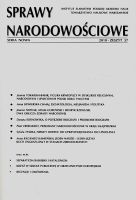Adam Gurowski i Henryk Rzewuski: Dwa oblicza zdrady narodowej w polskiej myśli romantycznej
Adam Gurowski and Henryk Rzewuski: Two faces of national betrayal in Polish Romantic thought
Author(s): Joanna NowakSubject(s): Cultural Essay, Political Essay, Societal Essay
Published by: Instytut Slawistyki Polskiej Akademii Nauk
Keywords: Adam Gurowski; Henryk Rzewuski; national betrayal; identity; ideology
Summary/Abstract: The term “national betrayal” had different meanings during the Partitions period in the history of Poland in the 18th and 19th centuries. However, despite evident temporal, spatial, and cultural discrepancies, “the ‘betrayal’ of the nation” has so far been categorized in rigid, dichotomous ways but should allow for more relativity as follows. One purposeful betrayal of national interests is motivated mostly by traitor’s wish to advance his own career, his social or material status. The betrayal of the nation can also result from fear of political repression for the activist’s deeds or targeted secret services operations against him. However, there were also cases of “tactical” betrayal in Poland so as to show indirect cooperation with the partitioning powers, as a compromise with a final aim to obtain Polish independence. But the most intriguing case is national betrayal based on ideological grounds: the conviction that the universal idea is superior to the national one. This involves resignation from independence due to an ideological assumption which is against the nation’s aspirations. Given this general background the author of the essay discusses two different cases of national betrayal, that of Adam Gurowski and Henryk Rzewuski. The former gave up the Polish national idea as well as the Polish language, customs and culture and Catholic religion altogether, with the aim of creating a complete Polish-Russian union. He fully believed in the benefits of Slavic unity under the leadership of Russia. Rzewuski on the other hand, though also denying the Polish national idea did not fully reject the Polish language and culture: in his view Polish language and culture should develop as a local culture and dialect in Russia, only partially identified with the state of the Tsars. As a result of this change, the Poles should accept only limited Russian influence. For Rzewuski, the Poles as part of the powerful union with the Russians could preserve their own economy and local dialect, despite the fact that Russian would become their official language.
Journal: Sprawy Narodowościowe
- Issue Year: 2010
- Issue No: 37
- Page Range: 61-76
- Page Count: 16
- Language: Polish

